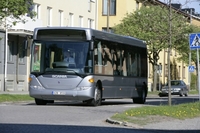Scania Presents the Bus of the Future: World-Premire for Scania's Ethanol Hybrid Bus
STOCKHOLM, Sweden--A full-size low-floor city bus that cuts fossil CO2 emissions by up to 90 percent if fuelled with ethanol and saves at least 25 percent fuel – that’s the essence of Scania's hybrid bus concept. The concept bus is conceived to make a major contribution towards sustainable public transport.
Scania's hybrid concept bus achieves all of these objectives, while meeting the lowest emission levels (Euro 5 and EEV). It also appeals to passengers because it is convenient and comfortable, to drivers with manoeuvrability for the tightest city environments and to operators since it uses technology designed to last the life of the bus. Energy storage makes use of supercapacitors, which are much more robust than batteries in heavy-duty operation.
Debuting at the UITP public transport congress in Helsinki 21-24 May 2007, the new Scania concept bus is the result of a three-year development project conducted at the Scania Technical Centre in Södertälje, Sweden. Hasse Johansson, Group Vice President Research and Development:
“Making public transport more convenient to attract more passengers is the best way to combat congestion and reduce environmental problems in cities. Scania's concept bus, with its low floor, big doors, uncluttered interior and automatic ticketing system is a big step in this direction. Passenger comfort and circulation are outstanding for a full-size city bus.
“The ethanol hybrid concept bus demonstrates Scania’s commitment to participate in the transition into a sustainable urban transport system – a transition that needs to start right away.
“Scania sees no reason to wait for other new fuels and technologies that could become viable in ten years’ time.
“With our innovative hybrid-drive concept we improve fuel economy and cut emissions by at least 25% and running on ethanol reduces fossil CO2 emissions by up to 90%. This combination of technologies paves the way for affordable and realistic city transport for many years to come.
“We are truly proud of this achievement,” concludes Mr Johansson.
Twelve conventional ethanol buses equipped with Scania's hybrid-drive system will start regular operation in Stockholm in 2008 and 2009 in cooperation with the city’s public transport operator, SL (Storstockholms lokaltrafik). Ten of these are partly financed by the Swedish Energy Agency.
Scania considers ethanol to be by far the most cost-efficient renewable fuel on the market today, taking into account factors like availability, infrastructure and access to proven technology. Depending on production method, fossil CO2 emissions are cut by up to 90%.
Scania (STO:SCVA)(STO:SCVB) is one of the world’s leading manufacturers of trucks and buses for heavy transport applications, and of industrial and marine engines. A growing proportion of the company’s operations consists of products and services in the financial and service sectors, assuring Scania customers of cost-effective transport solutions and maximum uptime. Employing 32,800 people, Scania operates in about 100 countries. Research and development activities are concentrated in Sweden, while production takes place in Europe and South America, with facilities for global interchange of both components and complete vehicles. In 2006, invoiced sales totalled SEK 70.7 billion and the net income amounted to SEK 5.9 billion. Bus production takes place in Sweden, Brazil and Mexico. Bodybuilding takes place in Poland and Russia.
Scania press releases are available on the Internet at www.scania.com



